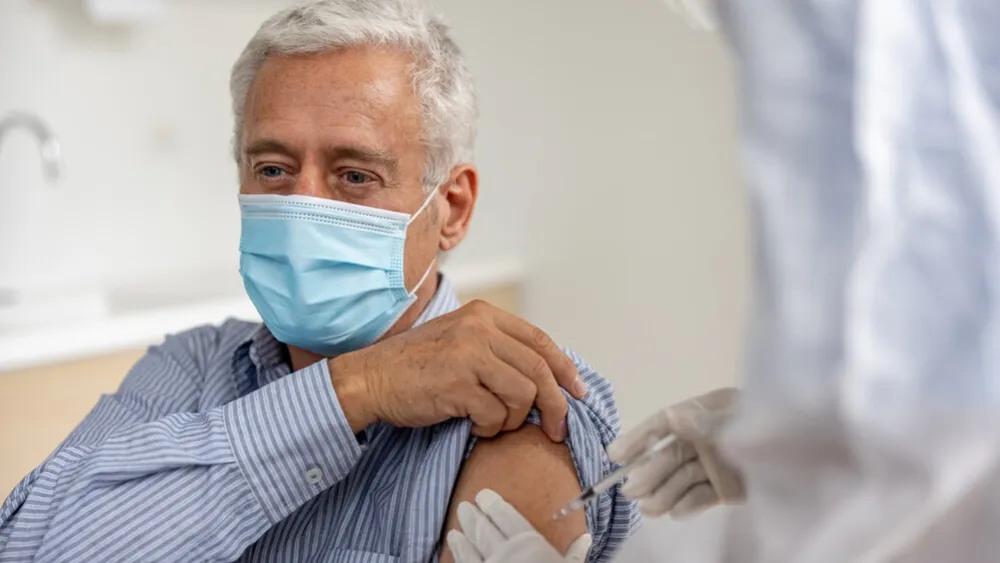Today's Medicine
COVID-19 Variants, Vaccines and Boosters: Where We Stand and What To Know
Published: July 18, 2022

As the COVID-19 pandemic stretches into its third summer, it seems like we’ve heard this story before: Vaccination and booster rates aren’t where we need them to be. Variants are infecting more people, which puts more people at risk. Hospitalizations and deaths are rising. And as fall approaches, we may be facing yet another surge in infections.
That’s the bad news, but there are plenty of positives.
Remember: We have vaccine options that are highly effective at preventing serious illness and death, and our understanding of preventing and treating COVID-19 infections has grown by leaps and bounds.
We’ve never had a better toolkit for fighting COVID-19, but it’s most effective if we all use it. With that in mind, here's what people should keep in mind regarding COVID-19 variants, vaccines and boosters.
The COVID-19 Variants Driving Infections: BA.4 and BA.5
The BA.4 and BA.5 Omicron variants are causing surges globally, with the BA.5 variant behind many of the newly reported cases in Nebraska and nationally. Those numbers may also be underreported because of the prevalence of at-home testing. The variants seem to be more contagious but less deadly and causing less severe illness – likely because of vaccinations and improved treatment options for COVID-19 patients.
That’s no reason to brush off these variants. People with heart disease, diabetes, obesity and other conditions are at greater risk of having severe COVID-19 infection.
Vaccines and Boosters Are Crucial. That Means 2 Boosters for Older Adults
The COVID-19 vaccines are still considered a game-changer for those who receive them. Simply put, while getting infected with COVID-19 is still possible, these vaccines dramatically reduce the chances of severe illness and death. Everyone who is eligible should get the recommended vaccinations and boosters against COVID-19. The Pfizer-BioNTech or Moderna vaccines are preferred in most situations, and both options have shown similar efficacy.
The topic of boosters can be confusing for some people. Why are they so important? Who needs one, and when?
Boosters, as the name implies, can boost or restore protection against COVID-19 that can diminish over time. That’s especially important for people who are 50 and older, who more often have the kinds of health conditions that can make a COVID-19 infection more dangerous.
The Centers for Disease Control and Prevention (CDC) recommends that everyone 5 and older should get a vaccine booster at least five months after the final dose in their primary vaccination series. For adults 50 or older and those who are immunocompromised, a second booster at least four months after the first is recommended. For more details on booster timing, visit the CDC’s COVID-19 Vaccine Boosters page or contact your primary care provider.
Infection Provides Some Natural Immunity, but Vaccination Is Better
There’s a misconception that after you’ve been infected with COVID-19, you’re essentially safe from it. Medical experts generally consider a person to be immune to COVID-19 for about three months following an infection. But there are ongoing studies to see if that timetable is still accurate two years into the pandemic, and how being infected with one variant translates into immunity against another.
Getting the recommended vaccinations, however, provides much longer-lasting and effective protection against COVID-19.
Kids Need Vaccinations, Too. But When?
The doctor in me recommends getting children vaccinated as recommended. The mom in me recognizes the strategizing many parents are doing: Should we wait until close to the school year to vaccinate or boost our kids, thereby giving them more protection around so many people?
If you have a child who has a medical condition or is in frequent contact with someone at greater risk for severe COVID-19 infection, I recommend getting them vaccinated and boosted as soon as possible. Furthermore, if your child is going to camp or participating in summer activities with many people, I strongly suggest getting them vaccinated and boosted now. But if your child is mostly at home and has no concerns about underlying health issues, you could consider waiting until closer to the school year.
Younger People Hoping for a 2nd Booster
Overall, booster rates aren’t what we’d like to see. That’s especially true among more vulnerable older adults. Meanwhile, many younger adults who received a booster last fall have questions about what’s next. Should they get a booster even though it’s not formally recommended?
Ideally, we’d all follow published recommendations for vaccines and boosters. But medicine doesn’t always have cookie-cutter solutions. If you’re concerned about waning immunity, reach out to your medical provider to weigh the risks and benefits of getting a booster early.
Our Future With COVID-19: More Variants? More Boosters?
It stings to say it, but COVID-19 will likely be with us for good. Unless more people globally take the necessary steps to prevent COVID-19’s spread, we should expect more variants. The hope is that they won’t have dramatic changes from their predecessors, like we’re seeing now, and show up less frequently.
More boosters may be on the way, too. It’s been nearly a year since people younger than 50 received their boosters, so a recommended second booster could be on the horizon. And we may see more boosters for older adults or those with certain medical conditions.
Simple Steps To Ensure Safety
The steady drumbeat of COVID-19 headlines has worn out many of us by now. But take heart in knowing how far we’ve come with vaccines, boosters and treatments that will continue to improve. Remember to take commonsense precautions like practicing proper hand hygiene, masking if community transmission is high and protecting others if you’re sick. And don’t hesitate to reach out to members of your medical team with questions. They’ll be happy to discuss your situation and the best decisions to safeguard your health.
COVID-19 may never completely go away, but we can learn to live with it by doing our best to protect ourselves and our loved ones.
More Resources
- Why give kids the COVID-19 vaccine? A Methodist pediatrician with kids of her own weighs in
- Read the latest information and stories regarding COVID-19.
- Get the latest COVID-19 information and recommendations from the CDC.


